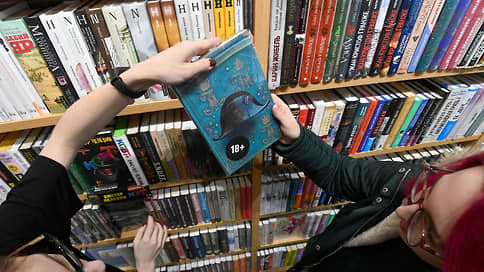Books fall off the shelves
[ad_1]

The share of books in the assortment of bookstores is declining, market participants say. According to their estimates, in March it was more than ten percentage points lower than a year ago, and for many players it was below 50%. In some chains, books occupy no more than 20-25% of the total area of stores. Bookstores introduce new product categories, such as vinyl records, to keep customers. Analysts attribute the trend to the rise in price of books, as well as to the departure of foreign copyright holders from Russia.
The Respublika chain of stores told Kommersant that in its Moscow bookstores and online stores in March 2022, more than 55% of the assortment was books, and by March 2023 the figure had dropped to 40%: “We are developing other categories of goods and introducing them in the range, for example, in one of the stores there is a wide selection of vinyl.
Chitai-gorod also talks about a decrease in the share of the book assortment in the total turnover of the network: “The difference arose due to the increase in the non-book assortment – souvenirs, stationery.”
The share of books in the Dom Knigi and Book+ networks is also declining, said Boris Mustashkin, CEO of the network, at the industry meeting Book Trade in the New Reality. Problems and Challenges” April 6: “Readers either buy books less frequently and selectively, or look for cheaper alternatives. At the same time, the share of books in stores is gradually declining, and in our country it is already only 52%. The indicators of previous years were not specified by Kommersant.
Inna Kasenova, commercial director of the Meloman/Marwin bookselling company, during a discussion at the same meeting, noted that in this network each store is considered separately, but the share of books in terms of area now occupies only 20-25%. According to her, “book retail is now in such conditions that it must lure a person with any effort.”
One of the reasons for the decline in the share of books in the total assortment of chains is the termination of contracts with foreign copyright holders, adds Vladimir Kharitonov, head of the Association of Internet Publishers: “Translated literature occupies a significant place in the retail assortment, both in the segment of fiction and in the top sales.” Also, in his opinion, the trend is associated with a general reduction in the range and an increase in the price of books. “Rising prices by almost 40% in just two years is too fast for readers to adjust to increased spending,” the expert explains.
Publishers, meanwhile, are afraid of an even greater increase in prices for their products due to new problems in settlements with foreign copyright holders (see Kommersant of April 12). Boris Kuznetsov, director of the Rosmen publishing house, predicted that, in general, we should expect a 10-15% increase in prices, including due to an increase in the cost of printing and materials.
Book chains “are trying to win the endless race with marketplaces,” where books are cheaper, says Kommersant’s interlocutor in the industry: “To do this, the assortment is expanding, for example, like the Republic, vinyl, players and small technical gadgets.” However, the Kommersant source emphasizes, the additional assortment should “organically combine with the main one, a bookstore cannot sell TVs.”
The reduction in the share of books in specialized stores has been going on for several years both in Russia and abroad, Mr. Kuznetsov specifies. The range of bookstores, he said, usually includes stationery, souvenirs, branded products, board games, and various hobby items. According to Mr. Kuznetsov, the trend is also related to “content fusion” and goes in both directions: “Just as these goods come to bookstores, books appear in the assortment of stationery and gift shops.”
[ad_2]
Source link





